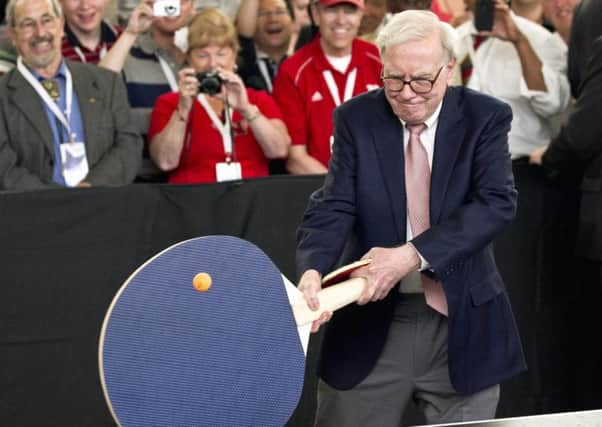Learning from the great investors... with The Motley Fool UK


Take the masterful Barcelona midfielder Xavi who, combining remarkable vision, mastery of technique and sumptuous poise, was the metronome underpinning one of the greatest football sides of his era.
When you hear him talk about the game, it sounds so simple. “[I] look for spaces. All day. I’m always looking,” he told the Guardian in 2011.
Advertisement
Hide AdAdvertisement
Hide AdMany people spend all day looking into space. They’re unlikely to win a World Cup medal.
When it comes to investing, there are many books that repackage and extol the wisdom of the “greats”, but to the above point, you probably won’t match their success.
That said, what are your financial goals? I’m guessing they’re somewhat more sedate than “buy mansion”. Perhaps you’d just like to retire early?
I know I don’t want to work well into my old age and, so long as I invest my money sensibly, I’m confident I can achieve that aim.
Advertisement
Hide AdAdvertisement
Hide AdMalcolm Gladwell, the bestselling author, popularised the “10,000 hour rule”: the idea that, to become an expert at any skill, you need to spend 10,000 hours practising.
Scientists have since debunked the idea, which is just as well, because I don’t want to spend 10,000 hours reading investing books.
But a certain amount of insight is invaluable. With that in mind, let me present to you the wisdom of two of the world’s most successful investors.
Nebraska-born Warren Buffett, known as “the oracle of Omaha”, started his first business when he was seven years old. They didn’t have air conditioning in 1937, and in the hot summers when people would cool off on their lawns at night, Buffett began selling his neighbours soft drinks. His grandfather, a grocery store owner, cut the budding entrepreneur a deal on Coca-Cola, which was the most popular drinks product.
Advertisement
Hide AdAdvertisement
Hide Ad“I had no inventory, I had no receivables... I had the best business I ever had!
“But I made one mistake. I didn’t put the money I received into Coca-Cola stock.”
This mistake was rectified when, some half a century later, Buffett invested $1bn in Coca-Cola. Ten years passed and that $1bn had turned into $10bn (a “ten bagger” in investing parlance). To this day he’s never sold any of his stake.
Eeach year Buffett writes an link annual letter to shareholders in his company, Berkshire Hathaway, which make for essential reading. “When we own portions of outstanding businesses with outstanding managements, our favorite holding period is forever,” he once wrote.
Advertisement
Hide AdAdvertisement
Hide AdCoca-Cola is the quintessential Buffett investment. The shares were trading at between 14 to 15 times earnings when he began accumulating his holding, which isn’t cheap, but nor is it expensive. (Generally, cheap shares have a price-to-earnings multiple of below ten.) What matters most is the quality of the business, and if the market fails to recognise that quality, and the shares are undervalued, that’s a bonus. Aim for at least a fair price.
What makes Coke a quality business? Due to brand loyalty Coke wields considerable pricing power. Even if the price of Coke rises, the majority of customers won’t seek an alternative.
You’ve probably heard all about Pfizer’s fight to takeover the UK pharmaceutical giant AstraZeneca (AZN). It’s only since becoming prey to a much bigger shark that Astra has started to approach its full value. The shares have risen in value in concert with our increasing regard - it’s often now referred to as a “jewel in the crown” of British industry.
But at one point the shares were hated, and Neil Woodford, one of the UK’s most successful fund managers, spotted an opportunity.
Advertisement
Hide AdAdvertisement
Hide AdStock markets are driven by humans, and not a single one of us is always right. If you multiply that basis to encompass an entire market what you get are discrepancies. Where others are calm and rational, many are rash and senseless.
At one point the sky was falling in on the pharmaceutical industry. A number of top-selling drugs were going off patent, meaning the blockbuster medicines of yesteryear would face stiff competition from cheap, generic treatments made by smaller manufacturers.
There was a sell off, and AstraZeneca was hit so that its R&D capabilities weren’t even factored into the share price. And now? The drugs pipeline is buzzing and Pfizer has a keen interest in a number of promising cancer treatments.
You should never be afraid, like Woodford, to go against the crowd. Woodford avoided tech stocks in the late nineties and was heavily criticized. Then the dotcom bubble burst and his clients were protected from heavy losses.
Advertisement
Hide AdAdvertisement
Hide Ad• If you’re looking for more tips to make money from the stock market, you won’t want to miss our exclusive free report, “Ten Steps to Making a Million”.
Download it for free at link fool.co.uk/millionaire